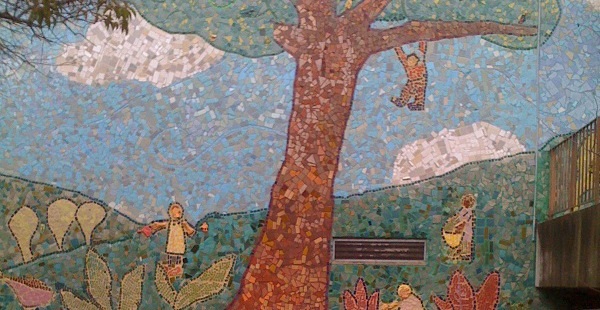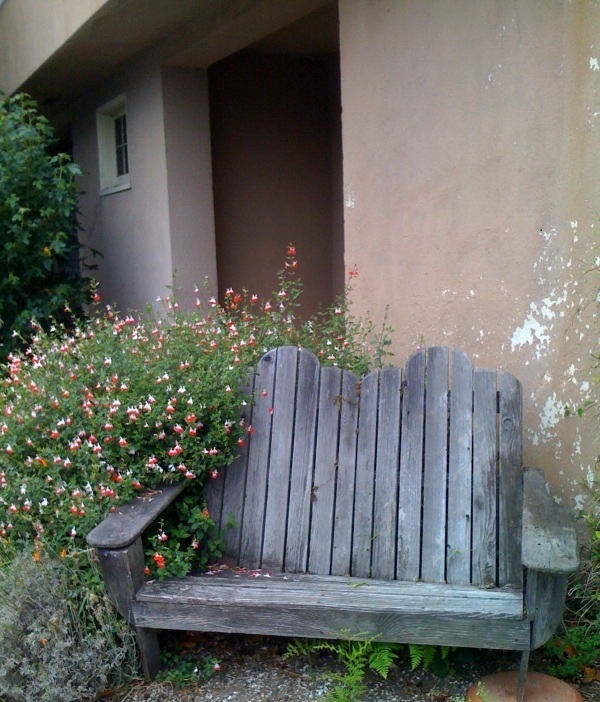
Children playing and gardening – Grattan School mural
5:45 a.m.
“Bonnie is dying, Rose.”
Betty, the village veterinarian, stands at the foot of the lanai. We’ve just finished sitting meditation and begun our morning warm-up exercises. I feel loose, at peace, ready for the new day.
“Can you come?”
“Of course. Let me just roll up my mat. I’ll be right down.”
Moments later I stride with Betty to the barn, her shoulders square, arms swinging freely at her side. She is easy with this passing, despite the sadness in her face.
Bonnie, matriarch of the village cows, has given milk and calves to the community for years. Most residents of the village know each animal intimately, having grown up with them, raised them, and cared for them in chore rotation.
Bonnie is especially loved. Many’s the villager with a tale about trudging into the hills filled with loss, anger or sorrow and being confronted–or more often nudged in a delicate place from behind–by old Bonnie.
I myself wept many hard tears into her neck during Marita’s illness and after her death. Bonnie knows who needs a nurturing heartbeat, a nuzzle and a shnuffle-snort.
Rounding the corner to the barn door, we find her, uncharacteristically supine, head in Jacob’s lap. Animals roam freely on the hills behind Ordinary, coming to the barn only for shelter. These past weeks, weakened by old age, Bonnie spends more days in the shelter of the barn than out.
Jacob strokes her ears and snout tenderly, singing to her, ever so faintly. I can’t make out the words. Betty sits, fearlessly, between two pairs of legs, and begins rubbing them with salve, pulling in long, slow, delicate strokes, ropey tendons standing out in the strong muscles of her arms.
For a moment I wonder if Bonnie might kick Betty in her distress, but somehow I know that even in a dying spasm, she could not hurt one of us.
I sit near Jacob, grateful for the hours of yoga training that keep me flexible. With my right hand, I make the Reiki sign, Cho ku Rei, close my eyes, inhale deeply, and wait for the heat to fill my hands.
When they tingle, I sense where on Bonnie’s body to lay them. I start with her spine, near her head. She breathes infrequently, labored, wheezing. When my hands tingle again, I shift them further down her spine.
After a few minutes, the three of us sitting with her, Bonnie’s breath comes easier. I feel singing in my body and hold it. Jacob’s song fills me.
My hands tingle and I move them again. Bonnie sighs long, a deep cleansing breath. She shudders and I lift my hands, separating them now, one almost under her here, above the hip bone, the other on top, just below her lungs.
I feel the music again, my mouth opens unchecked with song, joining Jacob’s. I don’t know why this happens sometimes with Reiki, the urge to sing as strong as the urge to push in childbirth. I tone more than sing–Ah’s turning to Oh’s to Eees and back to Ahhs.
My hands tingle and I shift one more time, both hands on Bonnie’s belly. Jacob holds her head gently between his hands. The Reiki heat fills the air between us, around us. The music swells, welling, and though my eyes are closed, I feel Jacob and Betty, calm, perhaps smiling as I smile, with love and comfort.
At peace, we three great friends, I cannot tell where one of us stops and the other begins.
Breathe in
Breathe out
Breathe in
Breathe out
After a time, singing again, this time outside the barn. The villagers sing for Bonnie. I open my eyes. The barn door is filled with people, keeping a respectful distance, and singing their love for this old friend.
Bonnie lifts her head, makes eye contact with each of us, looks to the door, lets out a low “Moo-oo,” and drops her head. For minutes after her last breath, we continue the Reiki, feeling her with us still. Tears run down my face.
A hush falls. Next I look their way, the villagers fill the barn, seated on the straw-strewn ground, on bales, anywhere they can find a perch. The entire village meditates silently, breathing in, breathing out. Tears come again, and I close my eyes.
There is a moment in every Reiki session where my hands lift involuntarily and I take a long cleansing breath. The session is complete. Today, in this moment, Jacob, Betty, and I simultaneously lift our hands. Hearing their long exhale, I glance up. Bonnie is at rest. We smile, fold our hands to our chest and bow.
Namaste.
Next, we bow to Bonnie, then turn and bow to her four-legged friends just outside the door–come to say goodbye? And finally, to her two-legged friends, our friends, sitting with us now.
“I will stay,” I tell Betty.
“And I,” Jacob says.
Betty understands, gathers her veterinary bag and can of salve, and walks to the door. A few villagers huddle close, hugging her.
Noah puts his arm round Betty’s waist, and they walk out together. He will draw her a hot bath, bring her tea, and massage her limbs as tenderly as she massaged Bonnie’s.
The remaining villagers remain silently erect, in sitting meditation.
We have work to do.


[…] I am mindful of the story Jonathon told, at Jacob’s prompting yesterday, a story ancient in their family history, handed down from parent to child for perhaps thousands of […]
LikeLike
That was beautiful Rose. It took me back to when I was a child and had a car accident. Because nothing happened to me, my family insisted that a sheep needed to be sacrificed. I eat meet but I hated the idea of an animal dying because I was fine. At the time I cried and begged them so much that they said they would not do it but some time later I found out that some money had been paid to someone to buy a sheep and you can guess the rest. I suppose the good thing about it was that the meat went to the needy but it still bothers me.
LikeLike
I am part of this Earth. I did not come from another planet. I am organic. I accept that. Your telling of this tale speaks of how we are all part of this and that we can respect all life and be grateful. Thank you for your thoughts.
LikeLike
What a beautiful telling of a deep and heartfelt relationship.My family once had a cow named Bonnie. That is not why I cried at reading your story, though. Thank you, again.
LikeLike
What a warm, loving beginning to a story all experience – death, loss, grieving, love. I didn’t expect to read graphic details of butchering. It jarred me as much as it made sense. What else would villagers do, but honor Bonnie in this way? I’m just more used to reading peaceful and easy passages about Ordinary that do not conjure up unpleasant images. Still, in spite of the violence of butchering, your writing remains honest and welcoming, and as always, I can’t wait until your next post.
LikeLike